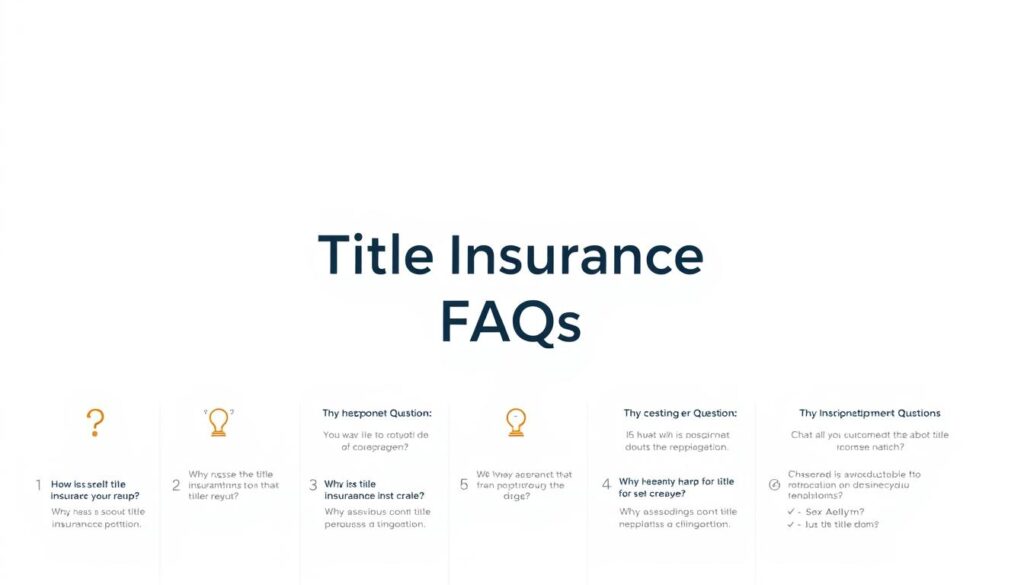When you think about owner financing in Georgia, knowing about title insurance is key. Owner financing lets buyers pay the seller directly, skipping banks. But, it also brings risks for both sides.
One big risk is the property’s title. Without title insurance, buyers and sellers might face surprises like hidden liens or ownership disputes. In Georgia, where property laws are strict, title insurance offers protection and peace of mind.
We’ll look into why title insurance is crucial for owner financing in Georgia. We’ll see its benefits and downsides. Plus, how it can help avoid problems and make the deal smoother.
Key Takeaways
- Understanding the role of title insurance in owner financing transactions.
- Identifying potential risks associated with owner financing.
- Exploring the benefits of title insurance for buyers and sellers.
- Learning how title insurance can mitigate risks in Georgia real estate transactions.
- Recognizing the importance of title insurance in ensuring a smooth property transfer.
Understanding Owner Financing in Georgia
In Georgia, owner financing is a good choice for many. It lets buyers pay the seller directly, not a bank. This is different from getting a loan from a bank.
What is Owner Financing?
Owner financing, or seller financing, means the seller pays for the buyer’s purchase. It helps both sides. Buyers get a chance to buy without a bank loan. Sellers get more buyers.
We’ll look at how it works and its effects on buyers and sellers in Georgia.
The Benefits of Owner Financing
Owner financing has many benefits:
- Flexibility in sale terms.
- Faster closings, less red tape than banks.
- Lower upfront costs, sometimes no down payment needed.
These perks make it appealing to buyers who can’t get bank loans. Sellers also like it for quick sales.
Common Terms in Owner Financing
Knowing the terms of owner financing is key. Important ones include:
- Promissory note: A legal promise to pay the seller.
- Deed of trust or mortgage: Protects the seller’s property interest.
- Balloon payment: A big payment at the end.
Understanding these terms helps everyone in an owner financing deal. It prevents problems.
The Role of Title Insurance
Title insurance is key in owner financing. It protects against risks of owning property.
What is Title Insurance?
Title insurance guards buyers and lenders from property risks. It makes sure the seller can sell and the buyer gets a clear title.
Key aspects of title insurance include:
- Verification of the seller’s ownership
- Identification of any liens or encumbrances on the property
- Protection against unforeseen title defects
How Title Insurance Works
Getting title insurance means checking public records. This confirms the seller’s ownership and spots any issues.
The steps involved in the process are:
- A title search is conducted to review public records
- Any issues identified during the search are resolved
- A title insurance policy is issued

Why Title Insurance is Important
Title insurance is vital in owner financing. It shields against title defects and unexpected liens.
The importance of title insurance can be seen in the following table:
| Benefits | Description |
|---|---|
| Protection Against Defects | Title insurance protects against defects in title, ensuring that the buyer has clear ownership. |
| Financial Security | It provides financial security for buyers by covering potential losses due to title issues. |
| Peace of Mind | Title insurance gives buyers peace of mind, knowing that their investment is protected. |
Legal Considerations in Georgia
When you do owner financing in Georgia, knowing the legal rules is key. This setup can be good for both sides but must follow certain laws.
Georgia Real Estate Laws
Georgia’s real estate laws set the rules for owner financing deals. They cover property rights, contract duties, and what buyers and sellers must do. It’s vital to know these laws to make a good owner financing agreement.
Key aspects of Georgia real estate laws that affect owner financing include rules on property disclosure, foreclosure, and contract legality. Following these laws helps avoid problems and makes sure the deal is legal and can be enforced.
Required Disclosures for Owner Financing
Georgia law requires certain disclosures in real estate deals, including owner financing. These disclosures help protect both sides by making sure everyone knows the deal’s terms, the property’s state, and other important stuff.
Required disclosures might include the property’s condition, any known issues, and the financing terms like interest rates and payment plans. Making these disclosures right and on time is key to avoiding disagreements.
Risks Associated with Owner Financing
Owner financing can be good but also has risks for both sides. Buyers might worry about the seller having too much control until the loan is paid off. Sellers might worry about the buyer not paying as agreed.
Risks associated with owner financing can be lessened by careful planning, doing your homework, and making sure the agreement is right. This might mean setting clear payment plans, having a plan for defaults, and making sure the agreement follows Georgia laws.
Benefits of Title Insurance for Owner Financing
When you’re thinking about owner financing in Georgia, knowing about title insurance is key. It’s not just an extra cost. It’s essential for making sure the property transfer is legal and valid.
Protection Against Defects in Title
Title insurance protects against title defects. These can include hidden liens, mistakes in public records, or unknown heirs. It covers the costs of fixing these problems, so you don’t lose money.
For example, if there’s a hidden lien on a property, the insurance company will help clear it. This keeps the buyer’s ownership safe. This is especially important in owner financing, where title problems can be more common.

Financial Security for Buyers
Title insurance gives buyers financial security. It protects their investment from title problems. This is crucial in owner financing, where buyers might lose their down payment if a problem arises.
It also helps prevent financial losses by finding and fixing title issues early. This can save buyers from expensive legal fights and financial problems later on.
Peace of Mind During the Purchase
Buying a property through owner financing can be stressful. Title insurance makes the process more secure and legitimate. It gives buyers peace of mind, knowing their interests are protected.
A real estate expert says, “Title insurance is vital in owner financing. It adds a layer of security that’s essential for a smooth transaction.”
“Title insurance is a safeguard against unforeseen title defects, providing financial protection and peace of mind to buyers and sellers alike.”
In summary, title insurance offers many benefits for owner financing. It protects against title defects, gives financial security to buyers, and provides peace of mind. It’s a key part of ensuring a secure and legitimate transaction.
| Benefits | Description |
|---|---|
| Protection Against Defects in Title | Covers costs associated with resolving title issues, preventing financial losses. |
| Financial Security for Buyers | Safeguards buyers’ investments against potential title issues. |
| Peace of Mind During the Purchase | Ensures a secure and legitimate transaction, reducing stress associated with the purchase. |
Risks of Skipping Title Insurance
Skipping title insurance in owner financing deals can put buyers and sellers at risk. It’s a key part that guards against legal and financial problems that might pop up during the deal.
Potential Legal Issues
Without title insurance, owner financing deals can lead to legal troubles. These can include fights over who owns the property, unclear or fake title transfers, and unexpected heirs or claimants.
- Disputes over property boundaries or ownership
- Undisclosed heirs or other claimants
- Fraudulent title transfers or forgeries
These legal problems can cause expensive lawsuits. This could lead to big financial losses.
Financial Losses
Financial risks are high when title insurance is skipped. If a title problem is found after the deal, the buyer or seller might have to pay a lot to fix it.
Examples of financial losses include:
- Costs to fix title problems
- Legal fees for defending against title claims
- Potential loss of the property or investment
Unforeseen Liens and Claims
Another risk of skipping title insurance is hidden liens and claims on the property. These can include:
- Undisclosed mortgages or other liens
- Unpaid taxes or utility bills
- Mechanics’ liens for unpaid work
These hidden claims can threaten the buyer’s ownership and investment in the property.
In summary, skipping title insurance in owner financing deals can lead to big legal and financial risks. Knowing these risks helps buyers and sellers make smart choices to protect their investments.
How to Obtain Title Insurance in Georgia
Getting title insurance in Georgia is key when you’re doing owner financing. It’s a step that protects your investment. It makes sure your deal is safe from title problems or disputes.
Choosing a Title Insurance Company
Finding a good title insurance company is the first step. Choose one with experience in Georgia’s owner financing. They should be licensed by the Georgia Department of Insurance and well-respected by real estate folks and clients.
Look at their financial health, customer service, and policy details. A good title insurance company will help you and keep your interests safe.
The Application Process
The process starts with an application to your chosen title insurance company. You’ll need to give them info about the property and the people involved. Also, the details of the financing agreement.
The company will then do a deep title search. They check public records for any liens or defects that could mess up the title.
- Give them all the needed documents, like property deeds and financing agreements.
- Check the preliminary title report for any problems.
- Fix any issues found in the title search.
Understanding Costs and Fees
Knowing the costs of title insurance in Georgia is important for planning. The price can change based on the property’s value and the company. It’s a one-time fee paid at closing.
There might be other fees for the title search, examination, and closing. Ask your title insurance company for a clear list of these costs to avoid surprises.

By following these steps, you can protect your owner financing deal in Georgia. Whether you’re buying or selling, the right title insurance gives you peace of mind and security.
Comparing Title Insurance Providers
When we look for title insurance providers, it’s key to compare them carefully. Georgia has many companies offering these services. We need to look at a few important things.
Factors to Consider
First, we should check their reputation and financial health. A good reputation in the real estate world means they’re reliable. Their financial stability is also important, as it shows they can handle claims.
We should also see what services they offer. Some providers might have more coverage or extra services that help during owner financing.
Customer Reviews and Ratings
Looking at customer reviews and ratings is a smart move. Good feedback from others shows they’re trustworthy and efficient. We should check reviews on different sites to get a full picture.
Also, seeing if they have any awards or special ratings is helpful. These can show their dedication to being the best.
Recommendations from Real Estate Professionals
Getting advice from real estate professionals is also wise. Agents, lawyers, and others in the field know a lot about title insurance. They can share their experiences.
Their advice can help us pick a provider that’s respected in the industry.
By thinking about these points, we can make a smart choice for our title insurance needs in Georgia.
The Closing Process for Owner Financing
The closing process is the final step in owner financing. It’s where the deal is sealed, and the property is handed over. This step is crucial for a smooth and secure deal for both sides.
What to Expect at Closing
At closing, many important documents are signed. Buyers and sellers need to review and sign things like the deed and title insurance. The details of the deal are finalized here.
The buyer will also look over the settlement statement. This shows all the costs of the deal. It’s a chance to ask questions and clear up any doubts.

Role of Title Insurance in Closing
Title insurance is key in the closing process. It makes sure the buyer gets a clear title. It protects against title problems like hidden liens or ownership disputes.
At closing, a title insurance policy is issued. This policy covers the buyer and lender. It ensures the buyer owns the property without unexpected issues.
| Aspect | Description | Benefit |
|---|---|---|
| Title Search | A comprehensive review of public records to identify potential title issues. | Ensures clear ownership |
| Title Insurance Policy | Issued at closing to protect against title defects. | Protects against financial loss |
| Closing Process | Involves signing documents and finalizing the transaction. | Ensures a smooth transfer of ownership |
Finalizing Ownership
The final step is transferring ownership. After signing all documents, the buyer becomes the property owner. It’s important to record all documents to show the ownership change.
After closing, the buyer gets a deed and title insurance policy. These prove ownership and protect against title problems.
Resolving Disputes with Owner Financing
Owner financing agreements can sometimes lead to disputes. But with the right knowledge, these can be effectively managed. It’s crucial to understand the potential disputes and how to resolve them.
Common Disputes We May Encounter
Disputes in owner financing can stem from various issues. These include misunderstandings about the terms of the agreement, payment disputes, or problems with the property title. For instance, a buyer may dispute the interest rate applied to the financing, or a seller may claim that the buyer has missed a payment.
Some common areas of dispute include:
- Payment Terms: Disagreements over the amount, frequency, or method of payments.
- Property Condition: Disputes about the condition of the property at the time of sale or during the financing period.
- Title Issues: Problems with the property title that can affect ownership or the ability to sell the property in the future.
How Title Insurance Can Help
Title insurance plays a vital role in mitigating some of the disputes that arise in owner financing. It ensures that the property title is clear and free from unexpected liens or claims. This can significantly reduce the risk of disputes related to title issues.
For example, if a buyer purchases a property through owner financing and later discovers that there is an outstanding lien on the property, title insurance can provide coverage for the costs associated with resolving this issue. This not only protects the buyer’s investment but also helps to prevent disputes with the seller over who is responsible for clearing the title.
Legal Resources for Resolving Issues
In the event of a dispute, having access to legal resources is crucial. Buyers and sellers involved in owner financing should be aware of their legal options for resolving disputes. These can include negotiation, mediation, or litigation.
| Dispute Resolution Method | Description | Typical Use Case |
|---|---|---|
| Negotiation | Direct communication between parties to reach a mutually acceptable agreement. | Minor disputes over payment terms or property condition. |
| Mediation | A neutral third party facilitates a discussion to help parties reach a resolution. | Disputes where parties want to maintain a relationship or need help finding a mutually beneficial solution. |
| Litigation | A court decision resolves the dispute. | Complex or high-stakes disputes where other methods have failed. |
Understanding these legal resources and knowing when to use them can help parties navigate disputes more effectively. This ensures that owner financing agreements are executed smoothly.
Frequently Asked Questions
Title insurance is key in real estate deals. We get many questions about it, especially when talking about owner financing in Georgia. Knowing about title insurance is very important.

What Does Title Insurance Cover?
Title insurance protects against title defects. This includes hidden liens, record errors, or unknown heirs. This is vital for both buyers and lenders to keep the deal safe and secure.
With title insurance, you can lower risks with the property’s title. This gives you peace of mind when buying.
Is Title Insurance Required in Georgia?
In Georgia, title insurance isn’t a must for owner financing deals. But, it’s strongly suggested. Many sellers and buyers choose title insurance to safeguard their interests and make the deal smooth.
Without it, you could face big financial risks if title problems come up.
How Much Does Title Insurance Cost?
The price of title insurance in Georgia changes based on the property’s value and the company. It’s usually a one-time fee at closing, costing from a few hundred to several thousand dollars.
It’s smart to compare prices from different companies to find the best deal for you.
Tips for Buyers Considering Owner Financing
When you’re looking at owner financing, there are important steps to take. It’s key to understand the process well to make a good choice.
Evaluating the Seller’s Terms
Start by looking at the interest rate, how you’ll pay back the loan, and any extra fees. A detailed check can spot problems early.
For example, a low interest rate might come with harsh penalties for late payments. Knowing these details helps avoid future problems.
| Term | Description | Importance |
|---|---|---|
| Interest Rate | The rate at which interest is paid on the loan | High |
| Repayment Schedule | The timeline for repaying the loan | High |
| Fees | Any additional costs associated with the loan | Medium |
Conducting Due Diligence
Due diligence is a must in owner financing. It means checking if the seller really owns the property and if there are any liens. It also means making sure all important information is shared.
Due diligence protects you and can lead to better deals. It requires careful attention and a good grasp of real estate laws.
“Due diligence is the bridge between a good deal and a bad one. It’s what separates the savvy buyer from the rest.”
Seeking Professional Guidance
Getting advice from experts like real estate lawyers and financial advisors is smart. They can explain your rights and duties.
A real estate lawyer can check the contract for legal issues. A financial advisor can look at the loan’s financial impact.
By carefully looking at the seller’s terms, doing thorough checks, and getting expert advice, you can confidently handle owner financing.
Conclusion: Making the Right Decision About Title Insurance
Title insurance is key in owner financing in Georgia. It protects against title defects, gives financial security, and brings peace of mind. This is important during the buying process.
Key Takeaways
We’ve talked about how title insurance helps manage risks and makes transactions smooth. Knowing its value helps buyers and sellers make smart choices with owner financing.
Final Considerations
When thinking about owner financing, remember the cost and benefits of title insurance. It helps avoid risks and makes deals secure. We suggest adding title insurance to owner financing deals. It protects against surprises and helps the deal succeed.
Using title insurance wisely can bring lasting benefits. It’s a smart choice for those in owner financing in Georgia.
